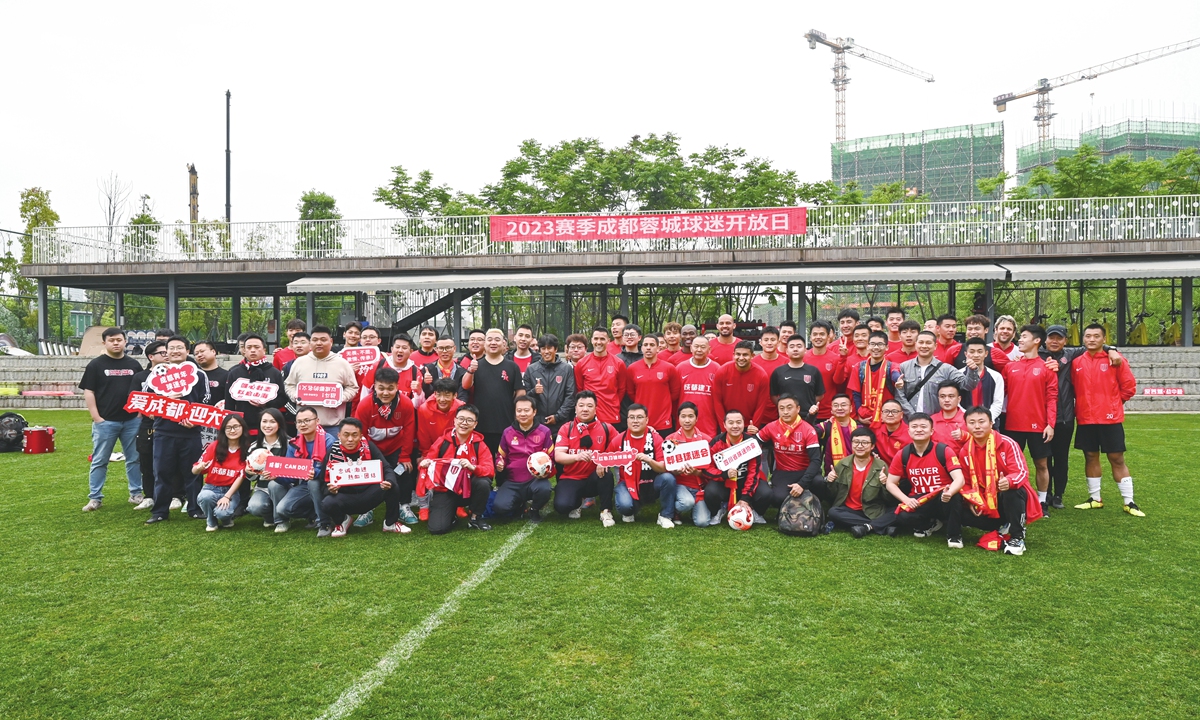
Phoenix Hill Stadium in Chengdu, Southwest China's Sichuan Province Photo: IC

The local team Chengdu Rongcheng club holds an opening day for club fans in Chengdu, Sichuan. Photo: VCG
Football fan Deng Junning says he regrets hesitating to get a season ticket for Chengdu Rongcheng before the Chinese Super League (CSL) started in April this year.
Having lived in the capital city of Southwest China's Sichuan Province for over a decade, Deng, who was born in Jiangmen in South China's Guangdong Province, said that the sport has made him feel part of the city.
"Watching football with the locals makes me feel connected with the city," Deng told the Global Times. "I am happy to have made so many friends here."
Deng is among thousands of fans who regularly go to the 60,000-seat Phoenix Hill Stadium in northern Chengdu to watch the home games of the team.
The team, founded in 2018, has fought all the way up, until it made into the CSL at the end of 2021.
It has been temporarily relocated to Leshan, a city which is around 140 kilometers south of the provincial capital, at the beginning of July while Chengdu prepares to host the Summer Universiade from July 28 to August 8.
Unexpected crazeTheir debut in Leshan on July 11 saw a 2-0 victory over Henan FC, bouncing back from a two-game consecutive losing streak, after a sensational 27-game undefeated run, the longest streak in the CSL's history.
Before the relocation, the official average attendance figure of Rongcheng in Chengdu was close to 40,000, the second biggest after 31-year-old club Beijing Guoan in the 2023 CSL season.
2023 is just the second season of Chengdu Rongcheng competing in the football topflight CSL, but the Chengdu fans' craze has caught certain people off guard.
The fans' craze has led to a shortage of official merchandise, as the official products sold out immediately.
In the end the fans have to rely on their creativity to support the team: Deng had to wear a Manchester United red jersey before he purchased a red-colored fan jersey to support the Chengdu team.
However, what is even more notable is the online craze around the purchase of game tickets.
Wu Huiman, in his 30s, is a lucky man who has successfully purchased the game tickets through WeChat seven times in a row.
Wu started bragging about his unusual achievement on his WeChat moments, after his third-time lucky purchase at the beginning of May.
"I don't have any cheating channel for the tickets, I think I am just super lucky," he told the Global Times.
Because of his luck, many of Wu's friends have started asking him to buy extra tickets for them.
"Purchasing extra tickets for others is never an issue for me as I love to go to watch the games with my friends, as long as I am lucky to get the tickets," he explained.
Another big fan of the Chengdu team is Chen Tao, the leader of the fan organization Red Blades, the biggest fan organization for the Chengdu team.
Facing the increasing demand of fans hoping to join the organization, the Red Blades had to shut down the access to the organization, as it cannot provide extra entry tickets this season to the registered fans, after it sold 2,000.
"We are hoping to reach 4,000 to 5,000 Red Blades members," Chen told the Global Times, before noting that this will be possible only with the support from the club.
Festive traditionA festive tradition has started at the end of each of Chengdu's home game.
It started with a music demo of the Beatles classic "Hey Jude" but with a revamped lyric of "Hey Chengdu" that was broadcast in the stadium at the end of the season starter.
"It originated in a demo we created in 2013," Chen told the Global Times.
"The simple and easy-to-learn rhythm instantly ignited a collective chorus throughout the venue," Chen said.
Chengdu fans inside the stadium indeed regularly open their camera flashlight when stadium lights are off at the end of a game, and they will sing songs together to celebrate the night.
Parents in several other cities in China have raised concerns about the slurs and smutty choruses that may be used in the stadium during football games, as they don't want to expose their children to this kind of influence.
However, in Chengdu efforts have been made in this area.
"Fan organizations are part of the social community and maintaining a civilized behavior while watching matches is a social responsibility that should be fulfilled," Chen noted. "We aim to pass on to them an inspiring, positive, and uplifting culture."
"That's why, until now, there have been no instances of collective insults or abuse toward referees or athletes in the Blade stand," said Chen.
Mao Jiale, a Chengdu-based sports commentator, said this kind of behavior deserves to be spread across the country. "If we consistently tolerate abusive language on the football field, parents will be even less inclined to bring their children to watch the matches."
"Eventually, the number of ordinary people attending games will decrease, which is not conducive to popularizing football among a wider audience," Mao told the Global Times.
"Watching football is a social activity, not limited to a particular group's rights."





